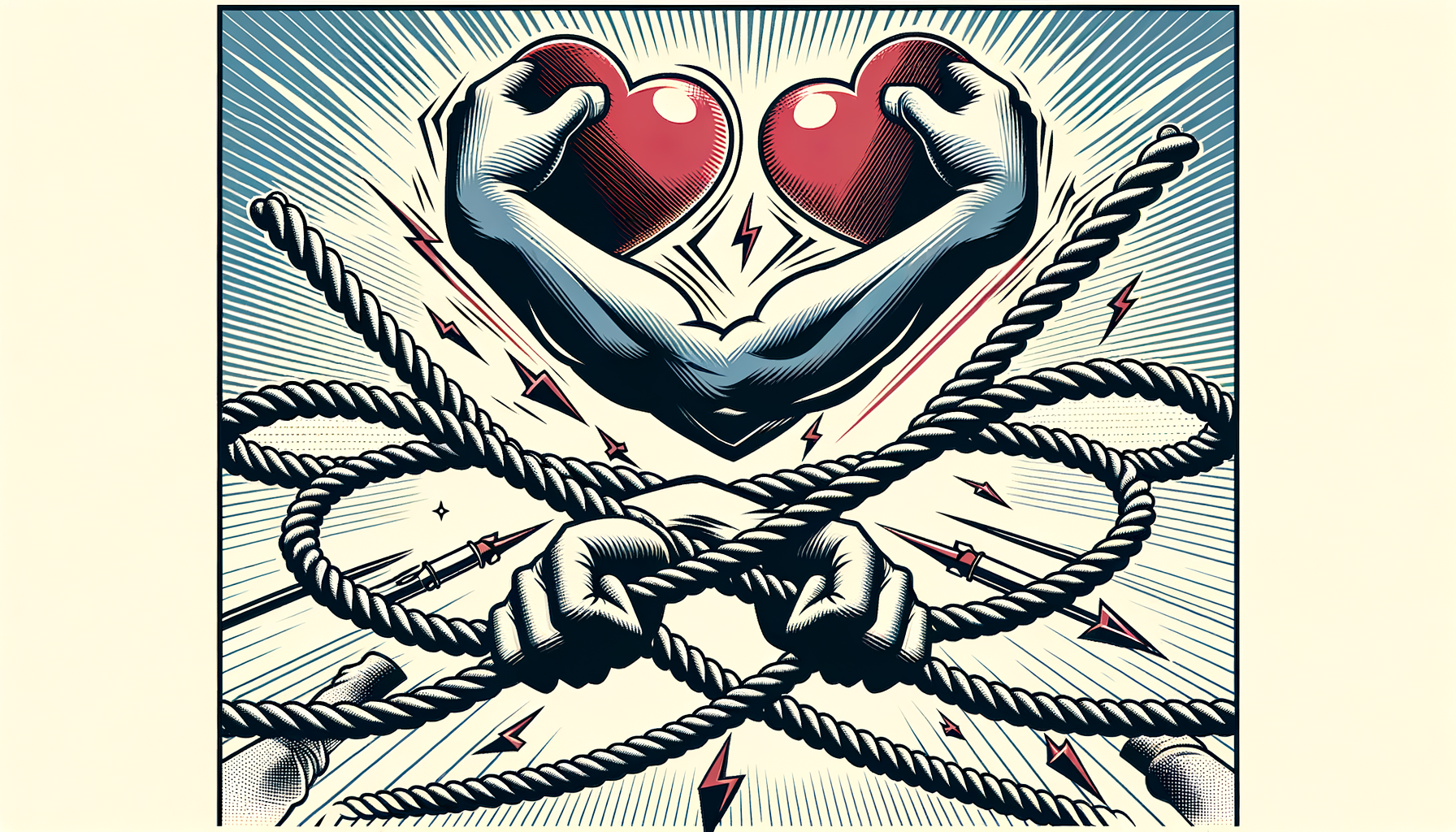They warned me this one wouldn't be easy.
Maybe it was the hushed encouragement from my editor or the way my fingertips wavered over my keyboard like a rookie cowhand steering a jittery mustang. I’d written about heartbreak, overshared about flirting in questionable places (pro tip: the line at the DMV = no), and spilled the beans on the secret to lasting connection (spoiler: there isn’t one, but snacks help). But this piece? This beast demanded honesty I hadn’t yet wrangled. It was less like writing and more like deciphering constellations in a stormy Wyoming sky—messy, difficult, and, for a while, impossible.
The hardest piece I’ve ever written reminded me of how tangled the road to vulnerability can be. Funny thing, though: it didn’t start as an essay about relationships. It was life elbowing its way into my work. Somewhere between rodeos, rough drafts, and romantic misadventures, I realized this impossibly difficult task had everything to teach me about connection in the modern West—or anywhere, really.
So saddle up: here’s how I survived my literary standoff with my fears and walked away with less about writing and more about love than I thought I bargained for. Spoiler alert: it just might help you, too.
Writing Doesn’t Lie (But Boy, Do We Try)
When I first started drafting the piece, I fell into a trap I know far too well—writing what sounded good instead of what was true. I took the high road, attempting to wax poetic about my chosen subject, tossing in polished metaphors like glitter on a budget cowboy hat. I avoided tough, thorny truths because, if I’m honest, facing those truths tended to make me squirm.
What I learned? It’s the same with relationships. Plenty of us throw up shiny distractions—witty one-liners or polite “I’m fine”s—when what we actually want to say is, “I’m scared” or, “Can we talk about what’s really going on here?” Vulnerability, in writing or love, can feel like guts spilled all over the floor. But here’s the kicker: those messier, more honest parts are what people connect with the most.
In the end, I scrapped about fifteen gleaming paragraphs that tried to sidestep the truth. The rewrite hurt—but it mattered. Whether you’re putting words on a page or sharing your words with a partner, authenticity beats sparkle every time.
Rewriting Is Relating: Why Connection Takes Work
For all of my love for a blank notebook on a quiet mountaintop, rewriting is the hardest step for me—second only to proofreading. It’s grueling to comb through something you thought you nailed, only to uncover weak logic, half-baked phrasing, or ideas so vague they’re practically a distant cousin to gibberish. Rewriting, though tedious, is where the magic happens. It’s where you roll up your sleeves and say, “How can I make this better?”
Sound familiar? Because relationships are exactly like that. Big spark moments might jumpstart the connection. But eventually, you hit the point where the novelty wears off. That’s when the real work begins. Relationships, like rough drafts, need constant tweaking—small improvements that turn “okay” into “incredibly meaningful.”
Some key lessons I’ve learned from the rewriting process—both in writing and in life:
- Don’t be afraid to scrap the fluff. That surface-level banter was cute in the early chapters, but it’s okay to dig deeper.
- Clarify your intentions. It can be messy (like crossing out half a paragraph or tackling an awkward “define the relationship” talk), but it ensures you’re both writing the same story.
- Accept that Draft 1 isn’t the final product. Even if you love something (or someone), there will always be room for growth.
Honestly, rewriting was where the hardest essay I’ve ever written came to life. And in relationships, it’s where deeper love tends to show up.
You Can’t Rush a Good Outcome (Ask Any Cowboy)
Patience. Ah, my oldest and most impatient enemy. Growing up in Wyoming, patience felt less like a virtue and more like a survival skill. It was waiting out mountain storms in a cabin, knowing no stomp of boots would fix things until nature decided it was good and ready. I assumed I was decent at patience until I sat staring at my essay draft, battling the instinct to rush just for the sake of finishing.
Relationships have a funny way of exposing this, too. We fall prey to the urgency of modern connection—stax messages answered in seconds, dates turning into instant “will this be forever?” evaluations. But some things can’t be hurried. Vulnerability can’t be forced, just like trust can’t be microwaved. They build slowly, like rivers carving through stone.
As I wrestled with my essay draft, I noticed a similar rhythm. Tackling the hard parts demanded time, small breakthroughs, and more than a little frustration. I had to let things marinate. Spoiler alert: my first love taught me the same. He and I met in late April, slow-danced in an old barn under sweeping May stars, and kissed by the light of early June mornings. By the time I rode west that September, back to my ranch life, I knew the glow wasn’t sustainable. Still, he taught me there’s joy in lingering pauses, even if it’s not forever.
The lesson here? The best outcomes in creativity—and connection—unfold on their own time. Trust the process, a phrase ranchers and poets equally seem to love.
The Surprising Catharsis of Letting Go
Here’s the most shocking truth: what made this essay so hard wasn’t the writing itself. It was the emotional weight I’d tied to it. I’d built it up in my mind as something monumental—and in doing so, I froze. I couldn’t access the freedom to explore, to experiment, to wander.
Something clicked the day I opened a fresh document and wrote, without judgment or fanfare. I let myself “mess it up.” And wouldn’t you know, the words flooded in like a thunderhead-turned-spring rain.
This is as true for relationships as it is for drafts. If you’ve ever clung too tightly to an outcome—an expectation, a fantasy, even a grudge—you know what I mean. Sometimes, the thing holding you back most isn’t “them”; it’s you. Letting go of control opens you up to surprise, catharsis, and the genuine joy of not taking yourself—or the situation—too seriously.
The Aftermath: What Writing Taught Me About Love, and Vice Versa
The hardest piece I ever wrote wasn’t hard because the topic was impossible. It was hard because it demanded the same things relationships do: honesty, willingness to revise, patience, and the ability to release old expectations. I won’t say it was a perfect essay, but it was mine—flawed and truthful in all the ways it needed to be.
So, what does this mean for you? Maybe you’re wrestling with your own “hardest piece”—a new chapter of love, an untold conversation, or the slow-building frustration of misunderstood intentions. Here’s what I want you to know:
- Vulnerability is never wasted. Whether it’s in writing or relationships, nothing grows on the surface. It’s the cracks that let things take root.
- Be patient with your drafts—and your heart. Nothing worth it comes easy. Not in Wyoming snowstorms, and certainly not in love.
- Give yourself permission to let go. Control won’t save you. A little courage, though? It just might.
Relationships, like stories, leave you changed if you let them. Whether they’re happy, bittersweet, or still a question mark in progress, they’re life lived in full—and that’s worth every moment.




















